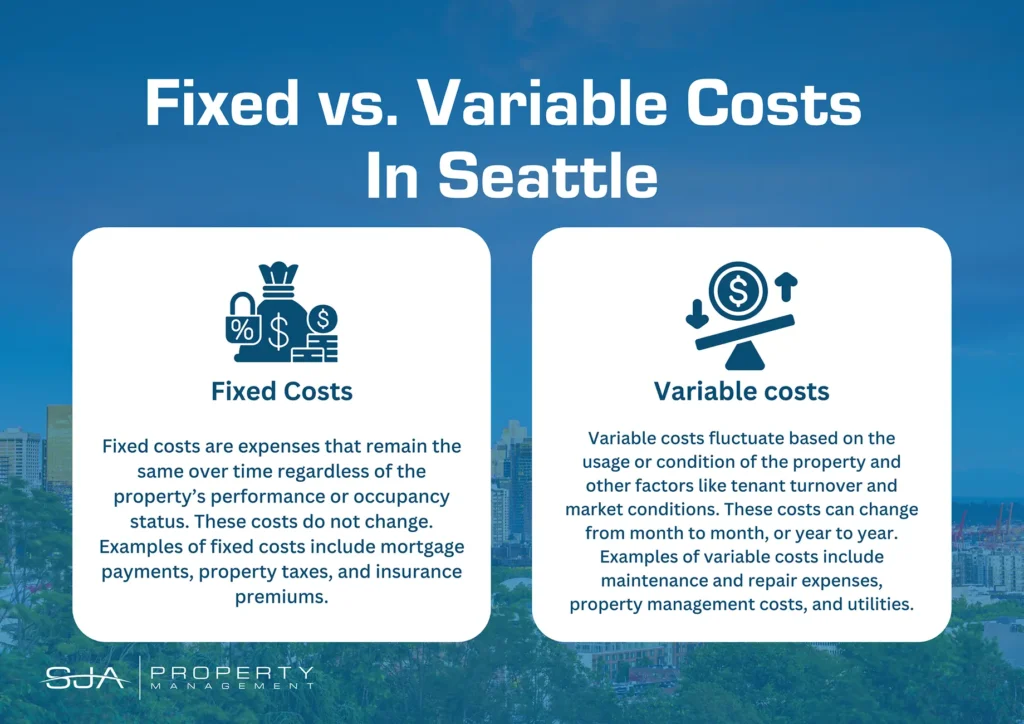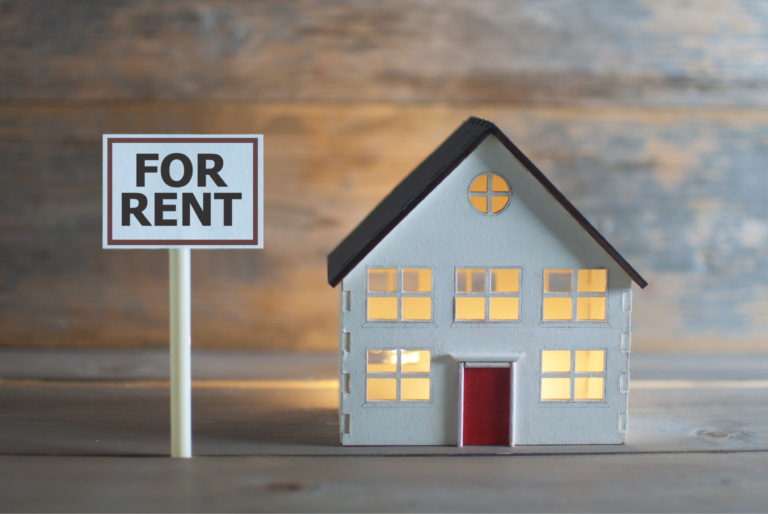Seattle is a vibrant, growing city with a strong rental market. It’s an appealing location for landlords and property investors who are looking for their first—or next!—investment property. But, owning and managing a rental property in Seattle comes with its share of expenses. Understanding the costs associated with rental property ownership is crucial for running a profitable business.
Our experience as property managers in Seattle makes us uniquely qualified to break down the various coast landlords can expect to pay in Seattle. In this blog, we’ll break down the costs you need to know, the difference between fixed and variable costs, and which costs fit into which category. Understanding these costs will help you better manage your rental property and ensure you’re prepared for the financial responsibilities that come with it.

Fixed vs. Variable Costs: What’s the Difference?
There are two types of costs landlords are responsible for: fixed and variable costs. We’ve found that the best budgets take into account which costs are variable and which are fixed. Let’s look at the difference between the two:
- Fixed costs are expenses that remain the same over time regardless of the property’s performance or occupancy status. These costs do not change. Examples of fixed costs include mortgage payments, property taxes, and insurance premiums.
- Variable costs fluctuate based on the usage or condition of the property and other factors like tenant turnover and market conditions. These costs can change from month to month, or year to year. Examples of variable costs include maintenance and repair expenses, property management costs, and utilities.
Now that you understand the difference between fixed and variable costs, we’ll break down the specific costs landlords in Seattle should consider when creating their budgets.
Fixed Costs for Seattle Landlords
Here are four fixed costs Seattle landlords may encounter.
1. Mortgage Payments
When we speak to our clients, it’s no surprise that they list mortgage payments as their largest—and most consistent—fixed cost. Whether you have a fixed-rate or adjustable-rate mortgage, your monthly mortgage payment is generally predictable and remains stable.
But, if interest rates change significantly—and you have an adjustable-rate mortgage—your payments could fluctuate. Seattle’s real estate market has seen significant price increases over the past decade, so many landlords may have larger mortgages, especially if they purchased property in the last few years.
Depending on your property’s value and your down payment, you can expect to pay anywhere from $3,000-$7,000 a month for your mortgage. According to Redfin, Seattle’s median monthly mortgage payment is $5,373.
2. Property taxes
Property taxes are set by local governments, and in Seattle, the tax rate is based on the assessed value of your property. Seattle’s property tax rate is about 0.85% of the assessed value, though this can vary slightly depending on the neighborhood. So, if your property cost the current median sales price of $835,000, you would be responsible for paying approximately $7098 annually.
Property taxes are typically assessed annually but paid in installments (usually two payments per year). Since they are tied to the value of your property, they will remain predictable unless the property’s assessed value changes or local tax rates shift.
3. Landlord Insurance
You’ve most likely heard of homeowner’s insurance—it protects your home in certain emergencies. For homeowner’s insurance to work, you need to be the primary resident of the property. In other words, it can’t be a rental property.
When you’re dealing with rental properties, you need to purchase landlord insurance. This is a necessary cost to protect your property and investment. While every policy is different, most landlord insurance policies cover:
- Property protection: This protects your physical property in the event of damage by fire, lightning, wind, and other covered losses.
- Liability protection: This helps cover the costs for another person’s medical bills or your legal expenses if said person is injured on your property and you’re held responsible.
- Other protection options: While not always included in a base package, you can add protection for vandalism, burglary, building code upgrades, and more.
According to Steadily, the average cost of landlord insurance in Washington State is $857 per year but it’s important to remember that the cost of insurance can vary based on the property’s location, size, and other factors. While this is true, the amount you pay each month for landlord insurance remains relatively stable, unless there is a claim or a change in coverage, making it a fixed cost.
4. Homeowners Association Fees
Some properties, particularly condos or townhomes, may have Homeowners Association (HOA) fees. HOA fees often cover shared amenities like landscaping, trash removal, and building maintenance.
HOA fees can vary widely depending on the property type and amenities provided but tend to be predictable once they’re set. Seattle HOA fees can range from $100 to $700 per month, but the average HOA fee in Washington State is $388.
5. Property Management Fees
If managing all the day-to-day goings-on of your properties doesn’t appeal to you, working with a professional Seattle property management company is the ideal way to manage your rental units efficiently and effectively.
A property management company will handle everything from screening tenants and conducting regular maintenance to overseeing emergency repairs and monthly rent collection. In Seattle, most property management companies charge a percentage of the rent for this service. Property management fees typically range from 8% to 12% of the monthly rental income, depending on the level of service provided, the rent, and the property’s location.
At SJA Property Management, our monthly management services range from 8% to 10% and include 24/7 maintenance and emergency response, annual property inspections, access to fully vetted vendors, year end accounting and financial reports, and much more.
Variable Costs
Investment property owners will also need to consider the variable costs associated with running a rental property.
1. Maintenance and Repairs
Over the course of our 15 years in the industry, we’ve seen just how unpredictable maintenance and repair costs can be for landlords. Whether it’s fixing a leaky faucet, replacing a broken appliance, or addressing structural issues, maintenance and repairs can add up quickly. These costs can be especially high if your property is older or if you’ve recently had a turnover and need to make significant improvements to attract new tenants.
Maintenance and repair costs are hard to predict and fluctuate greatly depending on the condition of your property and how often your tenants request repairs. A good rule of thumb is to set aside 10%-15% of your property’s value each year for maintenance.
2. Utilities
If your rental property includes utilities such as water, electricity, gas, or internet, these costs are your responsibility unless otherwise specified in the lease agreement. Utility fees are variable costs as they fluctuate depending on usage, seasonal changes, and the size of the property.
Because of their unpredictable nature, utility costs can become quite a burden on your budget, especially if you cover water, electricity, or gas for the tenant. Some landlords choose to charge tenants for some or all of the utilities as a way to shift part or all of the cost to the tenant.
Utility costs for a rental property in Seattle can range from $150 to $500 per month, depending on the size of the property and whether utilities are included in the rent.
3. Tenant Turnover
Tenant turnover can be one of the most significant expenses for landlords. Costs associated with turnover include cleaning fees, painting, replacing carpets or fixtures, advertising for new tenants, and screening new applicants. Seattle’s rental market can be competitive, but a higher turnover rate can lead to frequent vacancies and additional costs.
Tenant turnover costs depend on how often you have vacancies, the condition of the property, and how much maintenance or renovation work is required between tenants. Depending on the amount of work required to prepare the property for a new tenant, tenant turnover costs can range from $1,000 to $4,000.
4. Legal and Administrative Costs
There are many reasons why a landlord would require legal or administrative assistance—from the costs associated with lease agreements and eviction processes to bookkeeping services and other legal requirements.
In Seattle, where tenant protections are strong, landlords may need legal assistance when handling disputes or evictions. Additionally, you may need to pay for background checks, credit reports, and other administrative tasks.
These costs are typically one-off expenses that occur as needed—in our experience, legal and administrative costs can be one of the most variable costs landlords incur.
It can be difficult to budget for these costs, but in Seattle, legal consultations can range from $100 to $300 per hour, while background checks and credit reports typically cost $25 to $50 per applicant.
Budgeting for Fixed and Variable Landlord Costs in Seattle
Understanding the costs of being a Seattle landlord allows you to plan ahead and ensure your rental property is profitable.
Fixed costs like mortgage payments, property taxes, and insurance remain relatively stable, making them easier to predict and manage. On the other hand, variable costs such as maintenance, utilities, and tenant turnover require flexibility and ongoing attention. To maximize your profitability as a landlord, it’s important to budget for both fixed and variable costs, and plan for unexpected expenses.
If managing these costs and responsibilities feels overwhelming, hiring a property management company can be a valuable investment that saves you time and effort in the long run.
Ultimately, while the costs of being a landlord in Seattle can add up, with the right approach and careful financial management, property ownership can be a rewarding investment.
Fixed vs. Variable Costs FAQs
What’s the biggest cost of a landlord?
The biggest cost for a landlord is typically the mortgage payment. For most property owners, the mortgage is the largest and most consistent expense, especially if they have a loan on the property.
How much does the average landlord make in Seattle?
The average income for a landlord in Seattle can vary significantly based on the type of property, its location, and the rental market. On average, landlords can expect to earn between $1,500 to $4,000 per month in rental income for a single-family home or apartment.
How much do property managers charge in Seattle?
In Seattle, property management companies typically charge a monthly fee of 8% to 12% of the property’s rental income. For a property renting for $2,500 per month, you can expect to pay anywhere from $200 to $300 per month in property management fees.






